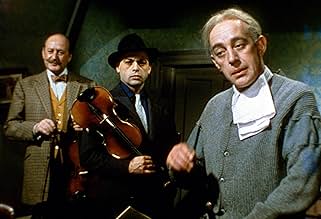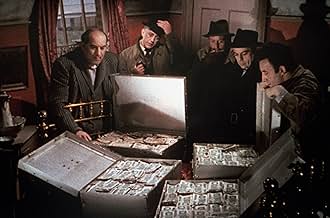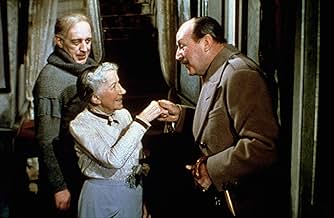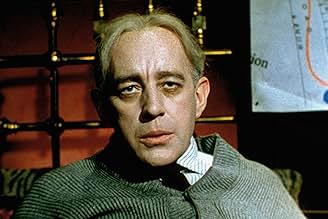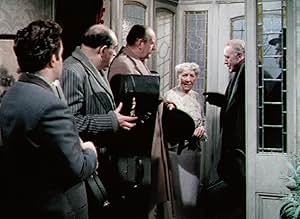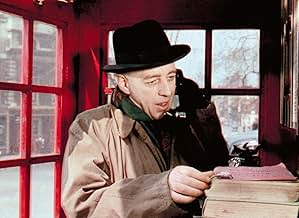Cinq criminels loufoques, qui préparent le braquage d'une banque, louent des chambres dans une rue tranquille auprès d'une veuve octogénaire en prétendant être des musiciens classiques.Cinq criminels loufoques, qui préparent le braquage d'une banque, louent des chambres dans une rue tranquille auprès d'une veuve octogénaire en prétendant être des musiciens classiques.Cinq criminels loufoques, qui préparent le braquage d'une banque, louent des chambres dans une rue tranquille auprès d'une veuve octogénaire en prétendant être des musiciens classiques.
- Réalisation
- Scénario
- Casting principal
- Nommé pour 1 Oscar
- 2 victoires et 5 nominations au total
- Large Lady
- (non crédité)
- Hypatia
- (non crédité)
- Bystander
- (non crédité)
- Cab Driver
- (non crédité)
- Burglar
- (non crédité)
- Burglar
- (non crédité)
- Detective
- (non crédité)
- Parcels Clerk
- (non crédité)
- Junk Man
- (non crédité)
Avis à la une
No less than the not-quite-ruthless-enough gang of criminals who scheme in her house, she lives in her own private universe with its own particular rules and values. Though she begins the film as the stereotype of a maddeningly officious pillar of local society, it gradually emerges that there is a freer as well as shrewder spirit locked in there than meets the eye. The umbrella she is always losing (she herself suggests that she unconsciously _wants_ to lose it), the escapologist parrot, and most poignantly the memory of a 21st birthday party interrupted by the end of the Victorian age, all hint at an inner life that the comic plot could easily have done without. The screenplay, deservedly Oscar-nominated, has the genius and economy to provide us with all these hints without ever slowing down a tightly-edited and superbly directed narrative.
The other characters are a good deal simpler, but Alec Guinness is in impressively seedy form as 'Professor' Marcus and Cecil Parker makes an appealing Major. Peter Sellers and Herbert Lom don't have a great deal to do and don't try to hog the limelight, but there's a nice cameo from Frankie Howerd. Ealing went out on a high.
The prospective tenant is played by Alec Guinness, a long time before he attained the respectable old age that would make him such a convincing guru in Star Wars. Here he's in his lusty comedic prime, and from the moment he makes his unforgettable entrance, you know The Ladykillers is going to be a classic. Somehow, despite the silly cartoonishness of the story -- a meddlesome old lady foils the well-laid plans of a group of a bumbling bank robbers -- this is an ultra-sophisticated film. And despite the track record of director Alexander MacKendrick, despite the inspired performances he elicits from his cast, chief credit for its success must go to screenwriter William Rose. Most other comedies of the era, even those MacKendrick directed, suffer from forced repartee and obvious one-liners, making the viewer feel like an anchor is resting atop his head. Rose -- living up to his name -- has a lighter touch, reminiscent of the best comedies of recent years ( namely Rushmore. ) He invests each and every scene with a memorable hook, while at the same time forswearing even the least contrivance.
For an example, take the scene where Mrs. Wilberforce confiscates the crooks' cello case full of "lolly" and stashes it in a locked closet. In almost any other movie, this emergency would be used as set-up, a new problem to solve, an excuse to pad the running time. In The Ladykillers, however, the crooks simply wait a few seconds until the old bat is gone, at which point one of them, the beefy one, rolls his eyes, raises his right arm, and negligently -- it's such a dainty little lock -- staves the closet in. Now that may not sound like much written here, it may not even sound very amusing, but when every scene in the movie boasts a similar surprise, the cumulative effect is exhilarating. Whether or not you enjoy the individual gags.
For some reason, The Ladykillers is never screened, and written about even less. I can ALMOST understand the latter kind of neglect -- it's a hard movie to write about because, for all the talent and skill of its creators, it doesn't give you a lot to chew on. But while you're watching, it's an incomparable entertainment, one of those movies where every line of dialogue, every camera angle, every twist and turn in the story is felicitously, rapturously perfect. A true addiction.
Alec Guinness is in top form as the leader of the gang, whose members reflects criminals of all walks of life. The ingenious plan is to rent out a room from a sweet old lady while they pull off a heist. The comedy, for me, lies in the difference between what is planned and what is played out, particularly in the difficulties that the gang of criminals have in outsmarting a sweet old lady who acts like a grandmother supervising a group of unruly grandchildren.
The problem that the movie has is that the pace is very slow and much of the comedy has faded over the years, but structurally and intellectually it remains a respectable film, even more now in comparison to its disastrous remake. What went wrong in the remake is that they did not maintain who the character of Mrs. Wilberforce was, because it was the juxtaposition of her as a frail old woman surrounded by toughened criminals that made it funny when things kept going wrong in their plan. In the remake she is replaced by Mrs. Munson, a tough-talking woman who was to be feared from the outset. There is no irony in being overpowered by someone more powerful than yourself from the outset, which I imagine is why the remake also featured Marlon Wayans and a case of irritable bowel syndrome, which I have never seen used in an even remotely amusing way.
While the original film may be a bit too slow for modern audiences, it is indeed charming the way 87-year-old Mrs. Wilberforce continually foils their carefully thought out plans, many times inadvertently. Alec Guinness is wonderful as the band's leader, wearing outrageous false teeth, nearly rivaling Lon Chaney as the man of a thousand faces, and Peter Sellers is one of the criminals as well. I'm no expert about British comedies or Alec Guinness' early works, but I can certainly tell enough from watching this movie that the Coen Brothers' remake did nothing to impress the British about Hollywood's respect for the classics.
Nevertheless, Katie Johnson as the infuriating Mrs Wilberforce almost succeeds in stealing the show. There cannot be a more annoying person in the world, from the point of view of policemen, criminals and baggage handlers alike.
The best scene of all, in my opinion, is the very last one, but I won't spoil it for you if you haven't seen it. I haven't actually watched the re-make of the film, and I'm certainly a big Tom Hanks fan, but I think it must be hard-pressed to beat this hilarious original. 8 out of 10. Obviously, it's rather old-fashioned and might not appeal to everyone's sense of humour. Ko, Izzy.
Le saviez-vous
- AnecdotesBecause Katie Johnson (who played the old lady) was already 76 when she got the role, director Alexander Mackendrick went to the distributor and asked if her name could be prominently above the title, saying that this might be her last movie. The distributor agreed. Two years later, Johnson died. She only made one more movie.
- GaffesWhen the policeman calls at Mrs. Wilberforce's house, he introduces himself as "Sergeant McDonald". At the end of the film, the Inspector refers to the same character as "Sergeant Harris". In the credits he is simply listed as "Sergeant".
- Citations
Professor Marcus: You're most kind, and if I may say so, you have a very curious and charming house. Such, um, pretty windows.
Louisa Wilberforce: Oh, thank you,
Louisa Wilberforce: [pointing to a window] And I rather favour positions...
Professor Marcus: [interrupting] I always think the windows are the eyes of a house, and didn't someone say the eyes are the windows of the soul?
Louisa Wilberforce: I don't really know. Oh, it's such a charming thought, I do hope someone expressed it!
- Crédits fousDuring the opening credits, roses are shown, to highlight the fact that William Rose wrote the screenplay.
- Bandes originalesMinuet in E major
(uncredited)
Written by Luigi Boccherini, arranged for string ensemble
[playing on the phonograph whenever the robbers are pretending to be practicing]
Meilleurs choix
- How long is The Ladykillers?Alimenté par Alexa
- Is this based on a book?
- How many ladies die?
- Who actually dies?
Détails
- Date de sortie
- Pays d’origine
- Site officiel
- Langue
- Aussi connu sous le nom de
- The Ladykillers
- Lieux de tournage
- Argyle Street, St. Pancras, Londres, Angleterre, Royaume-Uni(view down street from Mrs. Wilberforce's house)
- Sociétés de production
- Voir plus de crédits d'entreprise sur IMDbPro
Box-office
- Montant brut aux États-Unis et au Canada
- 23 213 $US
- Week-end de sortie aux États-Unis et au Canada
- 5 038 $US
- 6 juin 2021
- Montant brut mondial
- 50 276 $US
- Durée1 heure 31 minutes
- Couleur
- Rapport de forme
- 1.37 : 1(original & intended ratio/open matte, theatrical release, director specification)
Contribuer à cette page







